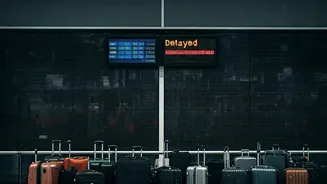Missing Essential Documents
One of the most frequent reasons for travel woes involves inadequate documentation. Having an incorrect or expired form of identification can lead to serious
complications at the boarding gate. Passengers should ensure that their identification meets all the specific needs of their destination country. Additionally, travelers should always double-check the validity dates on their passports, visas, and any other required travel documents. These documents are vital for the smooth passage through security checkpoints, and their absence or inadequacy can cause significant delays and ultimately, a missed flight. Planning ahead and meticulously examining all necessary documents is essential to avoid this avoidable error. Ensure the name on your ticket matches your ID perfectly to prevent potential issues during verification.
Luggage Overweight Issues
Another frequent mistake involves luggage. Many travelers arrive at the gate with baggage that exceeds the permitted weight or dimensions. Airlines impose strict rules on luggage allowances to ensure safety and efficiency during the flight. Overweight luggage can lead to extra fees, the need to repack or even being denied boarding if the plane is already full. Before reaching the airport, passengers should accurately measure their baggage and check the maximum weight limits and dimensions permitted by their airline. Packing smartly and considering the use of lightweight, smaller bags can help avoid issues. Furthermore, strategically placing heavier items in carry-on luggage can help adhere to the weight restrictions and prevent additional charges.
Late Arrival at Gate
Time management plays a crucial role in catching your flight. Arriving late at the boarding gate is a common reason for missing flights, and it's easily preventable. Passengers need to be aware of the check-in deadlines, security procedures, and the distance between the security check and the boarding gate. Airlines typically advise passengers to arrive at the airport at least two to three hours before departure for international flights and at least one to two hours before domestic flights. Allowing ample time to navigate through the airport, including potential delays at security, is essential. Regularly checking the flight status and gate information on airport displays or through the airline's mobile app can help you to stay informed of any changes and ensure timely boarding.
Problems with Payments
Payment-related issues can also hinder a smooth boarding process. Travelers may encounter problems with payment methods when purchasing extra services at the gate, such as baggage fees or seat upgrades. A common mistake is using cards that are declined due to insufficient funds, exceeding credit limits, or being flagged for security reasons. To circumvent this, travelers should always have a backup payment method available, such as a different credit card or sufficient cash. It is recommended to contact your bank or credit card provider before your trip to inform them of your travel plans and ensure that the cards are active and have sufficient available credit. Verifying your payment options prior to arrival at the boarding gate will eliminate any potential complications and ensure that you can take care of any payments you need to make.
Behavioral & Conduct Issues
Conduct and behavior are also critical factors influencing whether a traveler boards a flight. Disruptive behavior, such as arguing with airline staff, being intoxicated, or acting aggressively, can lead to denial of boarding. Airlines have the authority to refuse boarding to any passenger whose conduct is deemed to pose a risk to safety or cause disruptions. Travelers should maintain a respectful attitude and adhere to the guidelines set by the airline and airport authorities. Keeping calm, being patient, and communicating politely with the airline staff, even during stressful situations, can prevent potential issues and ensure you are allowed to board. Additionally, being aware of alcohol consumption limits and behaving responsibly is critical to avoid any issues.
Security or Customs Hurdles
Navigating security and customs procedures is another area where travelers may encounter problems. Passengers might inadvertently bring prohibited items into the security area or fail to comply with security regulations, which can result in delays or denial of boarding. Familiarizing yourself with the list of prohibited items before traveling can help prevent issues. These may include liquids exceeding a certain volume in carry-on luggage, sharp objects, or any items deemed dangerous. Adhering to all security instructions given by airport staff, such as removing shoes and electronic devices, can expedite the screening process. Furthermore, if you are traveling internationally, ensure that you fully understand customs regulations for your destination country to prevent any complications during inspection.
Missing Travel Documents
Perhaps the most basic error is missing the right travel documents. This encompasses more than just ID. Travelers often forget critical items like boarding passes, visas, or other essential documents. Ensuring you have all the required paperwork and that it's readily accessible is essential. Before you leave for the airport, double-check that you have everything in a secure and easily reachable spot. Many travelers find that creating a physical checklist or using a digital app to track essential items helps reduce the risk of forgetting anything important. Make sure that you have access to your documents electronically (on your phone or tablet) in case you lose the hard copies, or they get stolen. By preparing beforehand, this risk can be mitigated, leading to a much smoother journey.















